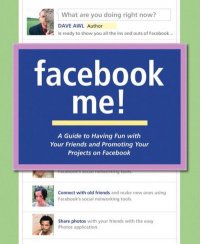Facebook has long been for me one of the last unexplored realms of social networking. Finally, when trying to convince new recruits to join me in using Twitter, I realized that so many of my friends, acquaintances, and colleagues were hooked on Facebook, I stood little chance of winning them over to Twitter without a deeper understanding of where Facebook fits in the social networking mix. I turned to the book “Facebook Me!” by Dave Awl to provide a solid background in how Facebook might work best for me and to help me understand how to integrate Facebook with the rest of the Web 2.0 applications I use. My review of this book from Amazon.com can be found below.

This book provides the ideal balance between introduction to the Facebook application and reference manual for the more experienced user. The first few chapters will prove a bit superfluous to all but the greenest of newbies. After that, you can count on some pretty solid information on using Facebook to enhance your online social communications leveraging the breadth of Facebook’s communication features. Several elements of the book appealed to me particularly:
- Very visual and, for the most part (ca. July 2009), up-to-date with respect to the latest enhancements to the Facebook user interface
- Offers pragmatic advice on using Facebook features without overhyping features such as messaging, where there are clearly other capable mediums.
- Provides a balanced view of Facebook’s features and alternatives for integrating other alternative mechanisms in with Facebook to augment the out-of-the-box offering.
I can’t emphasize the importance of the last two points to my assessment of the book. It showed me how to integrate other Web 2.0 technologies that I’m very happy with, e.g. FlickR for photos and Twitter for status updates, into Facebook. This integration allows me to enjoy what I believe to be the best of what Facebook has to offer (a huge social network of people you already know) with dramatically more sophisticated, open, and evolved media and messaging capabilities of other platforms.
For the new to intermediate Facebook user, this may be the only book they’ll ever need. More dedicated and fanatical Facebook users might find that this book doesn’t go deep enough. I find myself somewhere in between. I’ve caught on to Facebook pretty quickly but I still don’t plan on using the majority of features outlined in this book. That’s why the book is a solid 4 starts for me. Were I a bit more into Facebook and a bit less into other Web 2.0 technologies, I could see this being a 4.5 or 5 start book.